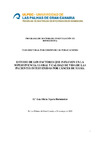Please use this identifier to cite or link to this item:
https://accedacris.ulpgc.es/jspui/handle/10553/76681
| DC Field | Value | Language |
|---|---|---|
| dc.contributor.advisor | Vega Benítez, Víctor Manuel | es |
| dc.contributor.author | Tejera Hernández, Ana Alicia | es |
| dc.date.accessioned | 2020-12-15T11:38:05Z | - |
| dc.date.available | 2020-12-15T11:38:05Z | - |
| dc.date.issued | 2020 | - |
| dc.identifier.other | Tercer Ciclo | - |
| dc.identifier.uri | https://accedacris.ulpgc.es/handle/10553/76681 | - |
| dc.description | Programa de Doctorado en Investigación en Biomedicina por la Universidad de Las Palmas de Gran Canaria | en_US |
| dc.description.abstract | Existen factores que permiten predecir un mayor riesgo de recaída local en el cáncer de mama. La presencia de receptores de progesterona negativo, el uso de neoadyuvancia con quimioterapia y la presencia de enfermedad a distancia, son variables conocidas que han demostrado ser fundamentales para determinar la supervivencia de las pacientes, por lo que se deben de tener en cuenta a la hora de planificar un tratamiento quirúrgico. . La coordinación entre el equipo quirúrgico y el radioterapéutico es fundamental para obtener buenos resultados globales. Si se realiza una correcta selección de las paci entes y de la técnica quirúrgica asociada, se puede realizar una cirugía de reconstrucción mamaria con seguridad , generando un buen grado de satisfacción de las pacientes y mejorando su calidad de vida . La radioterapia intraoperatoria es una técnica consolidada que nos permite asociar un tratamiento adyuvante a el acto quirúrgico. Las modificaciones quirúrgicas necesarias para realizar la técnica son mínimas y las complicaciones no son significativas en comparación a el abordaje quirúrgico convencio nal. El beneficio para las pacientes es evidente y la seguridad de las mismas es la prioridad al momento de seleccionarla. La investigación en el cáncer de mama debe continuar ofreciendo respuestas a nuestras pacientes, siendo fundamental la selección de diversos tratamientos en el marco de un equipo multidisciplinar. Visualizar la enfermedad desde diferentes puntos de vista nos permite obtener mejores resultados, lo que se demuestra en un aumento de la supervivencia y de la calidad de vida. | en_US |
| dc.description.abstract | There are factors that allow predicting an increased risk of local relapse in breast cancer. The presence of negative progesterone receptors, the use of neoadjuvant chemotherapy, and the presence of distant disease are known variables that have been shown to be fundamental in determining the survival of patients, so they must be taken into account when to plan a surgical treatment. . Coordination between the surgical team and the radiotherapy team is essential to obtain good overall results. If a correct selection of the patients and the associated surgical technique is performe d, a breast reconstruction surgery can be performed safely, generating a good degree of patient satisfaction and improving their quality of life. Intraoperative radiotherapy is a consolidated technique that allows us to associate an adjuvant treatment wit h the surgical act. The surgical modifications necessary to perform the technique are minimal and the complications are not significant compared to the conventional surgical approach. The benefit for the patients is evident and their safety is the priority when selecting it. Research in breast cancer must continue to offer answers to our patients, with the selection of various treatments being essential within the framework of a multidisciplinary team. Visualizing the disease from different points of view allows us to obtain better results, which is demonstrated in an increase in survival and quality of life. | en_US |
| dc.language | spa | en_US |
| dc.subject | 320101 Oncología | en_US |
| dc.subject | 320112 Radioterapia | en_US |
| dc.subject | 3213 Cirugía | en_US |
| dc.subject | 32 Ciencias médicas | en_US |
| dc.subject.other | Cáncer de mama | es |
| dc.subject.other | Recaída local | es |
| dc.subject.other | Supervivencia | es |
| dc.subject.other | Complicaciones | es |
| dc.subject.other | Radioterapia post mastectomía | es |
| dc.subject.other | Calidad de vida | es |
| dc.subject.other | Radioterapia intraoperatoria. | es |
| dc.subject.other | Breast cancer | es |
| dc.subject.other | Local relapse | es |
| dc.subject.other | Survival | es |
| dc.subject.other | Complications | es |
| dc.subject.other | Post mastectomy radiotherapy | es |
| dc.subject.other | Quality of life | es |
| dc.subject.other | Intraoperative radiotherapy | es |
| dc.title | Estudio de los factores que influyen en la supervivencia global y calidad de vida de las pacientes intervenidas por cáncer de mama | es |
| dc.type | info:eu-repo/semantics/doctoralThesis | en_US |
| dc.type | Thesis | en_US |
| dc.type | Thesis | en_US |
| dc.type | Thesis | en_US |
| dc.investigacion | Ciencias de la Salud | en_US |
| dc.type2 | Tesis doctoral | en_US |
| dc.utils.revision | Sí | en_US |
| dc.identifier.matricula | TESIS-1991000 | es |
| dc.identifier.ulpgc | Sí | en_US |
| dc.contributor.buulpgc | BU-MED | es |
| dc.contributor.programa | Programa de Doctorado en Investigación en Biomedicina por la Universidad de Las Palmas de Gran Canaria | es |
| item.grantfulltext | open | - |
| item.fulltext | Con texto completo | - |
| crisitem.advisor.dept | Departamento de Ciencias Médicas y Quirúrgicas | - |
| crisitem.author.dept | Departamento de Ciencias Médicas y Quirúrgicas | - |
| crisitem.author.fullName | Tejera Hernández, Ana Alicia | - |
| Appears in Collections: | Tesis doctoral | |
Page view(s) 5
197
checked on Jan 10, 2026
Download(s)
188
checked on Jan 10, 2026
Google ScholarTM
Check
Share
Export metadata
Items in accedaCRIS are protected by copyright, with all rights reserved, unless otherwise indicated.
